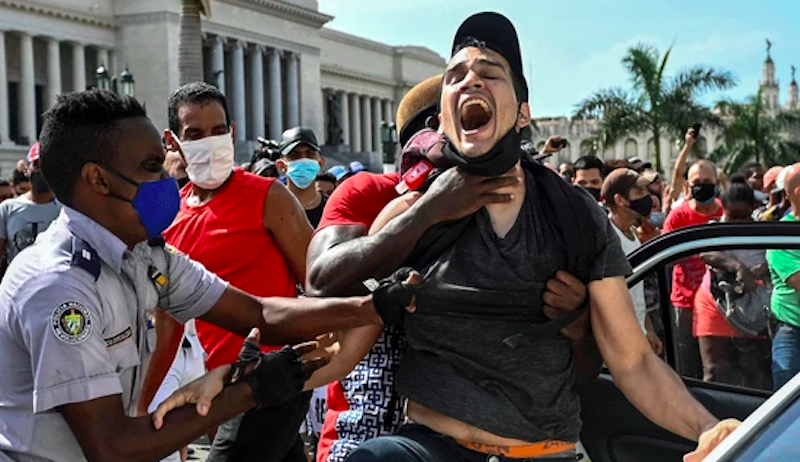
Edgardo Lupe, a portly 45-year-old Cuban American man in basketball shorts and a cutoff shirt, stood on his front lawn in Miami’s Westchester neighborhood, watering a mamey tree with a garden hose.
“I’m so proud of my family in Cuba protesting for their rights against an oppressive dictatorship,” began Lupe, growing progressively more emotional. “They want their freedom, they want food, they want the opportunity to thrive in their own country, they want a future, but more than anything else,” Lupe projected his voice over the chain link fence separating the yard from his neighbor’s. “They want me to call Carlos Villanueva un sapingo for visiting Cuba in 2015 and voting for ese tremendo socialista Biden!”
“¡Me cago en tu madre!” came a response across the fence from (I assume) Mr. Villanueva.
“I am doing absolutely everything in my power to support the protestors in Cuba,” exclaimed Amanda Collares, a 25-year-old marketing manager currently bent over her phone. “Which is why I just called my mother a hypocritical racist on my family’s WhatsApp chat for championing Cuban Americans blocking highway traffic but not last year’s BLM protestors.”
Florida International University’s Cuban Research Institute recently published a comprehensive study outlining several actions Cuban Americans can take to help their friends and family on the island. They are, in descending order of effectiveness, as follows:
- Publicly comparing loved ones to any of the following historical figures: Stalin, Hitler, Fidel Castro, and/or Che Guevara.
- Retweeting derogatory messages with four or more exclamation marks.
- Memes. The cruder the better.
- Self-righteous Facebook posts.
Meanwhile, on the streets of San Antonio de los Baños, Guillermo Cabreras, a 21-year-old Afro Cuban university student, huddled behind a metal dumpster while beanbags and gas canisters whizzed overhead. When asked if his second-cousin’s snarky Instagram story calling out her high school classmate helped him overturn 60 years of totalitarian subjugation, he responded, “¿Que Instagram ni Instagram? Si aquí cortaron acceso al internet.”
He shoved me aside to avoid a rubber bullet fired at my head.
“Le agradecemos el apoyo de nuestra familia en la Yuma, pero el pueblo cubano será el autor de su propio destino. Por eso estamos en la calle.”
Cabreras jumped from behind the dumpster, cried “¡Patria y Vida!” at the top of his lungs, and charged a phalanx of Cuban security forces with dozens of compatriots.
If you like our stories, check out the first free chapter of our new book.
